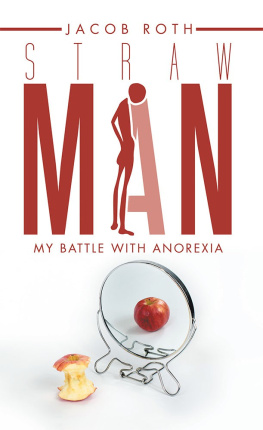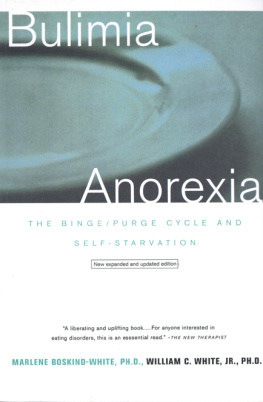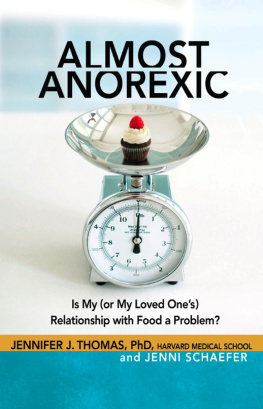Becoming Anorexic
Anorexia tends to be studied within health disciplines, such as medicine, psychoanalysis or psychology. When the condition is discussed in relation to society more broadly, focus is commonly restricted to considerations about the demise of the traditional family meal or the all-pervading obsession with thinness and media representations of size zero models. But what can sociology tell us about anorexia and how a person becomes anorexic? This book draws on empirical research both interviews and observation conducted in and outside medical settings with anorexic girls, medical staff, teachers and other teenagers of the same age. As such, it offers the first fully sociological treatment of the condition, taking the reader closer to the actual experiences of people living with anorexia. It retraces the behaviours, practices and processes that create what is patterned as an anorexic career and reveals the cultural and social characteristics of the people who engage on this path, taking them from a simple diet to hospitalization or recovery. Richly illustrated with qualitative research, Becoming Anorexic demonstrates that anorexia can be viewed as a very particular work of self-transformation, which requires specific and social dispositions. As such, it will appeal to scholars of sociology and anthropology with an interest in health and illness, the body, social class and gender.
Muriel Darmon is a CNRS Senior Research Fellow at the CESSP (EHESS, Paris 1 Panthon-Sorbonne), France.
Routledge Advances in Sociology
For a full list of titles in this series, please visit www.routledge.com/series/SE0511.
State Looteries
Historical continuity, rearticulations of racism, and American taxation
Kasey Henricks and David G. Embrick
Lesbian, Gay, Bisexual and Trans* Individuals Living with Dementia
Concepts, practice and rights
Edited by Sue Westwood and Elizabeth Price
Family, Culture, and Self in the Development of Eating Disorders
Susan Haworth-Hoeppner
Origins of Inequality in Human Societies
Bernd Baldus
Confronting the Challenges of Urbanization in China
Insights from social science perspectives
Edited by Zai Liang, Steven F. Messner, Youqin Huang and Cheng Chen
Social Policy and Planning for the 21st Century
In search of the next great social transformation
Donald G. Reid
Popular Music and Retro Culture in the Digital Era
Jean Hogarty
Muslim Americans
Debating the notions of American and un-American
Nahid Kabir
Human Sciences and Human Interests
Integrating the social, economic, and evolutionary sciences
Mikael Klintman
First published 2017
by Routledge
2 Park Square, Milton Park, Abingdon, Oxon OX14 4RN
and by Routledge
711 Third Avenue, New York, NY 10017
Routledge is an imprint of the Taylor & Francis Group, an informa business
2017 Muriel Darmon
The right of Muriel Darmon to be identified as author of this work has been asserted by her in accordance with sections 77 and 78 of the Copyright, Designs and Patents Act 1988.
All rights reserved. No part of this book may be reprinted or reproduced or utilised in any form or by any electronic, mechanical, or other means, now known or hereafter invented, including photocopying and recording, or in any information storage or retrieval system, without permission in writing from the publishers.
Trademark notice: Product or corporate names may be trademarks or registered trademarks, and are used only for identification and explanation without intent to infringe.
British Library Cataloguing in Publication Data
A catalogue record for this book is available from the British Library
Library of Congress Cataloging in Publication Data
Names: Darmon, Muriel, author.
Title: Becoming anorexic: a sociological study / Muriel Darmon; translated by Lucy Garnier.
Other titles: Devenir anorexique English.
Description: Milton Park, Abingdon, Oxon; New York, NY: Routledge, 2017.
Identifiers: LCCN 2016019184
Subjects: LCSH: Anorexia nervosaSocial aspects.
Classification: LCC RC552.A5 D3713 2017 | DDC 362.196/85262dc23
LC record available at https://lccn.loc.gov/2016019184
ISBN: 978-1-4724-6650-1 (hbk)
ISBN: 978-1-315-56883-6 (ebk)
Typeset in Times New Roman
by Sunrise Setting Ltd, Brixham, UK
This book is based on my doctoral thesis in sociology. I would like to thank my supervisor Franois de Singly for his support throughout my research on such an unusual topic. I am also grateful to my PhD examiners Claudine Herzlich, Bernard Lahire, Eric Plaisance and Jean-Manuel de Queiroz for their comments, advice and constructive criticism.
I would also like to thank everyone who helped me as I wrote this book, by listening to me, encouraging me, asking questions, making suggestions or disagreeing with me. I am particularly grateful to the people who read the manuscript of either the thesis or the book: Anne-Marie Arborio, Isabelle Baszanger, Thomas Bnatoul, Sverine Gojard, Hugues Jallon, Hlose Kolebka, Bernard Lahire, Frdrique Matonti, Anne Paillet and Delphine Serre.
This monograph was first published in French in 2003. The English-language translation would not have been possible without the generous support of the TEPSIS LabEx project and the additional help of my research laboratory, the CESSP (European Centre for Sociology and Political Science). I am also very grateful to Neil Jordan at Routledge for having believed in this project enough to revive it when I was almost ready to turn the page. Finally, my deepest thanks go to Lucy Garnier for the extraordinary quality, subtlety and precision of her translation.
Last but not least, I would like to express my deep gratitude to all the people who agreed to become part of my fieldwork in one capacity or another. In order to protect their privacy, I cannot thank them by name, but suffice it to say that without them this book would not exist.
This book has been translated thanks to the generous support of the TEPSIS LabEx, ANR-11-LABX-0067, coordinated by the EHESS.
Wallis Simpson is generally credited with having decreed a woman can never be too rich or too thin. This book focuses on teenage girls who apply at least part of this saying to the letter and on a diagnosis that runs counter to its premise, by positing that young women can be too thin or have lost too much weight. Another book on anorexia? you might ask and its true that there have been quite a few. This book differs from the others, though, in one important way: it is grounded in sociology, a discipline that might seem to have a somewhat questionable remit for discussing anorexia. How can we do a sociology of anorexia? Is it right, even just on an epistemological level, for sociology to study something that at first sight seems to fall only under the realm of the psychological and pathological?









